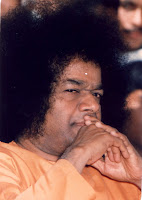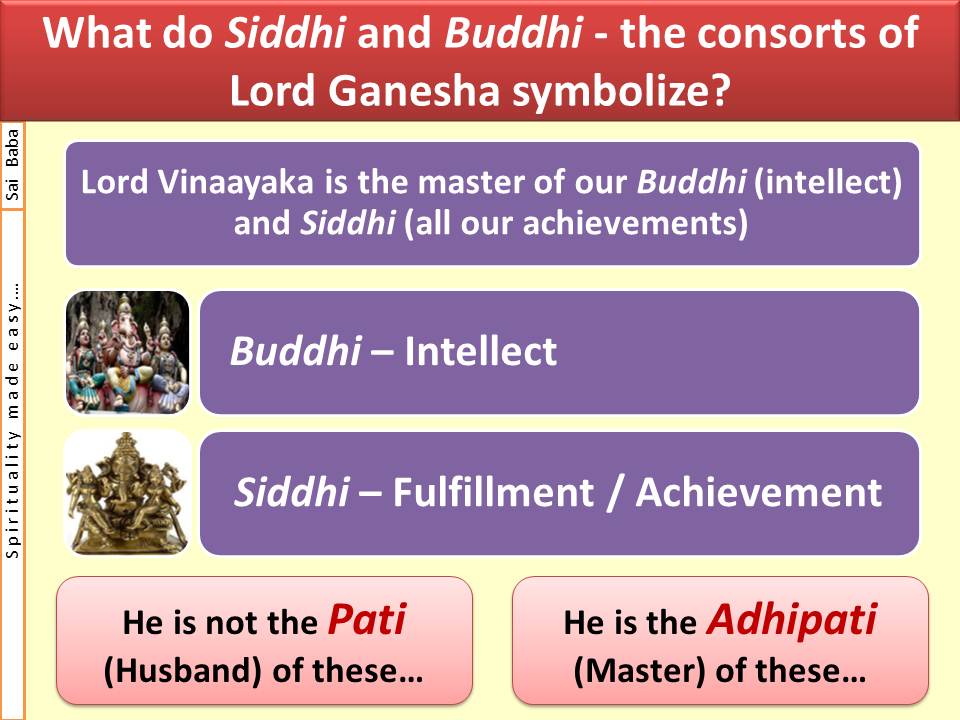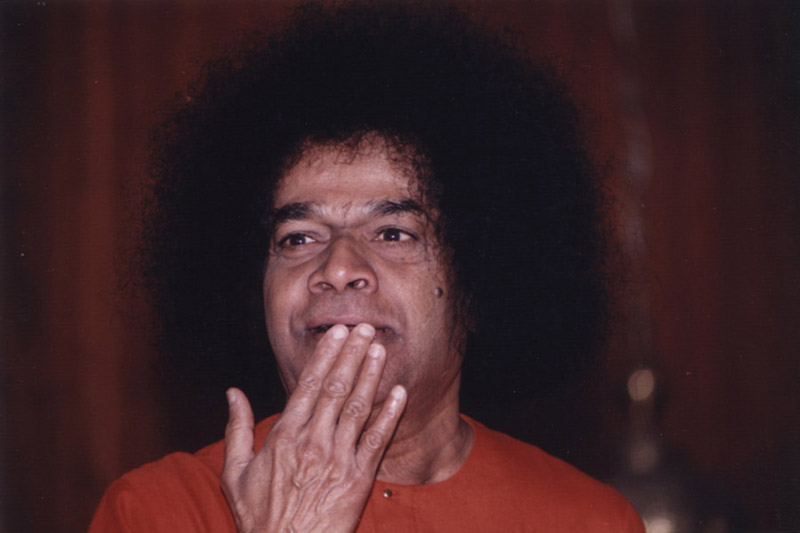This section of the blog presents a message of Bhagawan Baba every week. Mostly, it is the form of a question that is answered by Bhagawan, giving us the correct understanding and interpretation of a concept or a term or a practice. So watch out every Sunday for a special message from Bhagawan Baba that could serve as your driving force throughout the week. Wish you a happy week!!
Vinaayaka is the one with the power and capability of supreme intelligence. Humans derive happiness and joy because of the combination of Buddhi (intelligence) and Siddhi(fulfilment or achievement). Therefore, in the worldly stories (Puranas), Siddhi and Buddhi are referred to as the consorts of Vinaayaka. Since, He is the master (adhipati) of intellect and wisdom, He is referred to as their husband (pati). Thus being the master of Siddhi and Buddhi, Vinaayaka is called the leader or the adhipati of these. Humans derive happiness and bliss because of the combination of Buddhi (intelligence) and Siddhi (fulfilment or achievement). That is why; happiness and bliss are also referred to as the children of Vinaayaka.
Vinaayaka is the one with a pure heart. Siddhi (fulfilment or achievement) and Buddhi (intellect) are His two eyes. The two eyes of Siddhiand Buddhi are regarded as His two consorts. Thus Vinaayaka is the Nayakaor the leader of Siddhi and Buddhi. To have Siddhi (fulfilment), one must have Buddhi (intellect). To have Buddhi(intellect), we must develop the feeling of gratitude in us. For the one without any gratitude, the intellect will be destroyed. Once the intellect is destroyed, how can you have any fulfilment or achievement? Sarva Siddhi Sampradaaya Namah – Vinaayaka is the one who bestows on you all the achievements (success). We need to make an effort to recognize this principle of Lord Vinaayaka.
What is the inner significance of the elephant head of Ganesha?
Vinaayaka has supreme intelligence. In the morning when I came to the Hostel, Sai Gita (the elephant) came towards Me trumpeting with delight! She does not trumpet at any other car. My car came and behind My car, there were another 80 cars. The moment My car came and she heard the sound of My car, she came trumpeting loudly to the road. See, how clever she is. She has so much wisdom and intelligence. That is why any individual who is very intelligent is generally referred to as the one having the intelligence of an elephant (gaja telivi – elephant intelligence). The elephant has such supreme intelligence. Therefore, the reason behind placing an elephant head for Vighneshwara, is to declare to the people through this symbol, that He is the one of great intelligence. Otherwise, why else would they create Him with human hands and legs and with the head alone as an elephant head? They gave maximum importance to His intelligence (medha shakti – power of intelligence).
Vighneshwara is created with the head of an elephant and the vehicle of a mouse to declare to the world the ideal and the truth that Divinity is not limited to the human form only. Divinity exists even in insects and in all beings. The elephant is supremely intelligent. It is full of loyalty. It will never forget its master, even if it loses its life. Without forgetting the master, so long as it is alive, with the principle of Divinity in it, it nurtures a sense of gratitude. The elephant stands for the quality of gratitude. Gratitude is a very sacred quality. Kshama (forbearance) is truth, kshama is dharma, kshama is vedam, kshama is non-violence, kshama is indeed everything. The elephant is the very embodiment of kshama (forbearance). The elephant would be ready to even give up its life, but it will never tolerate any pain to its master.
What is the inner significance of the Mushika (mouse) being the Vaahana (chariot) of Lord Ganesha?
What is this elephant head and a mouse vehicle for Ganesha? The mouse is called a Mushika. The Mushika is a symbol for the night. Night stands for darkness. Therefore, the mouse symbolizes darkness (darkness of ignorance). Since, Ganesha has trampled the darkness beneath Him (kept it under check), He is referred to as the one having a mouse as a vehicle. Vinaayaka is the master who dispels the darkness and bestows light on the world.
What is the meaning of the title Vinaayaka?
He is also known as Vinaayaka. Vinato Naayaka Iti Vinaayaka – The one without any master (leader) is Vinaayaka. Vinaayaka has no leader. He is all independent (absolutely free). Everybody (in this world) has some leader (master), everybody has some authority above them, but Vinaayaka has no master. The one with the mind alone has a master. But, where is the (need for a) master for the one without a mind? Thus, Vinaayaka is the principle that transcends the state of amanaska(mindlessness). Without understanding this true principle of Vinaayaka, we merely regard Him as the physical and visible form having the trunk of an elephant, with four hands and with ears like fans. Vinaayaka is the master for the entire world, the universe, and all the beings.
What is the meaning of the name Ganaadipati and Ganapati?
29 August 1995
What is the message that the family of Lord Shiva conveys?
This is a family of four members: Iswara, Parvati, Vighneshwara and Subramanyam. They symbolize Paramatma (Divinity), Prakruti (Nature), Buddhi (Intellect) and Siddhi(Fulfillment) respectively. These four stay together in unity. If we enquire about this from a worldly point of view, the chariot of Iswara is the bull and the chariot of Pravati is the lion. The bull and the lion are great enemies. (Swami sings the Telugu song – Tandava Kelisalpene Parameswarudu Sri Sambasivudu…). Lord Shiva has the Ganga on His head and fire (in the form of the third eye) in His face (forehead). Fire and water are opposites. However, they remain there without assuming or manifesting any opposition. Given all this, the family dances the Tandava dance.
09 September to 15 September 2013
 |
| Bangaaroo |
I often call you as Bangaaroo, Bangaaroo (gold, gold). What do we mean by Bangaaroo(gold)? You are the one with Hiranyagarbha(golden womb – cosmic principle). Hiranyagarbhaaya Namah (obeisance to the Hiranyagarbha– cosmic principle). Your entire heart is full of the principle of Hiranya (gold). The gold may be converted into any ornament. If not an ornament, it can be at least kept as a coin. Therefore, the one that gets transformed into certain forms is gold, the one without any form is also gold. Thus, with a form you are gold and even in the formless state you are gold.
Teachers Day Special
O2 September to 08 September 2013
Serve the world. We are born in this world for undertaking service and not for wielding authority. What is this authority? We are born mainly to serve others. God made us take birth (in this world) only for the purpose of service. Therefore, understand the truth that we are born for service. Service does mean government service or this or that service (i.e. your jobs). You can do your respective services (jobs). But the real service is service to humanity, service to the world. Help the poor. Serve the sick people. Give strength and empower the weak people. Life is not meant for earning money to fill our stomachs alone. Recognize the truth that there are crores of people out there who also have a stomach that needs to be filled. They go through so many difficulties. We must take the initiative to help and serve such people. Then alone will our lives be truly fulfilled.
28 August 2013 – Krishnaashtami Special
Yashoda said, “Krishna, you do not eat what I am offering to you. You go to the houses of the cowherds and collect fistfuls of butter from their pots and eat it. The matter has come to the knowledge of all on the streets. What is this madness? Is there no butter in our house? Why should you not eat when I offer to you? Why does the butter from other houses appear so tasty for you? Because you steal that butter, the whole village is full of noisy complaints. Your full mouth has the smell of butter. The entire village is protesting with so many complaints. You are such a small child. Why are making so much mischief in this Gokulam? You should not do this.”
 |
| Krishna is the stealer of hearts!! |
Not all can recognize the reality of Krishna. We think, “Oh! He is the son of Yashoda, who indulges in silly acts like taking butter from one house and dropping it in another’s house.” Why should Krishna indulge in this type of “cheating”? We consider this as “cheating”. No, it is not cheating at all. There is a lot of significance in this. What exactly is butter? When milk (after curdling and transformed into curd) is churned and the essence is extracted from it, it assumes the form of butter. Similarly, to bring forth or manifest God (as unity), who resides in all forms of life (as diversity), such churning has to be carried out. There is Divinity in such unity.
Wherever Krishna went, people thought that He had committed theft. “Theft” is a very bad word (bad accusation). If he were to be a thief, why would he leave traces of butter smeared all over his face? No, no, no. Yashoda herself had this doubt, and asked, “O Krishna! Your entire mouth smells of butter, the whole village is agog, and there are complaints galore. You are so small. Can you be the cause of such trouble? What is this mischief? Is there no butter in our house? Will I not give you if you ask? Why should you take butter going to all their houses?”
What is the meaning of the word Krishna?
We must understand properly the meaning of the term Krishna. The word has three meanings. One is “Krishyathi Iti Krishnah”(The one who cultivates is Krishna). Krishimeans cultivation. What is it that has to be cultivated? Krishna cultivates the Hridayakshetra (field of the heart). He removes the unwanted weeds of bad qualities, waters it with the water of love and softens it, ploughs it with the use of sadhanaand sows the seeds of devotion to God. This is how Krishna cultivates the field of our hearts. This is “Krishyathi Iti Krishnah”.
26 August to 01 September 2013
Samskrithi means the one that is refined or transformed. The word samskrithi, originates from the root samskritham. It refers to the process of refinement of every object that is in its natural form, before it is made fit for human use. A small example; we eat rice every day. But consider how many transformations are undergone by paddy before it reaches this state and becomes fit for consumption. Threshing the paddy grains from the sheaves, winnowing and separating grains from chaff, pounding or milling to remove the husk from the grain, cleaning the rice by removing extraneous matter like small stones and weed seeds, etc., soaking the raw rice in water, and finally cooking over fire to get cooked rice that we can eat. Such samskrithi (refinement) makes it possible for us to consume the rice. Samskaaram(transformation) also enhances the value of things. For instance, the value of paddy is, say, one hundred rupees per bag. But, when it is dehusked and cleaned in the milling process and made fir for consumption, the value of one bag of rice becomes six hundred rupees. What is the reason for one sack of paddy costing a mere Rs.100, to assume the value of Rs.600 when it is converted into a sack of rice? The value comes from the process of transformation.
19 August to 25 August 2013
 |
| True unity is unity with God |
First of all, you must develop purity. When purity develops in you, unity will come to you naturally. When there is unity, Divinity will manifest itself. So long as there is no purity, we will never get unity. Unity with whom? Is mixing with and connecting to our friends, unity? No. no. Primarily, unity must be with God. Once you achieve this (Divine) unity, you will, in a very natural way, get worldly unity.
15 August 2013 Special
What is the meaning of Swatantram (freedom)? Tantram means Atma (Self). Swaa-Tantram means following the Atman, coming under the control of the Atman (Self). Paraadheenam Dukham Atmaadheenam Sukham – One who is under the control of others will be full of sorrow, while one who is under the control of the Atman will be full of happiness. Therefore, it is called Swaatantram, i.e. follow your heart (not physical heart but spiritual heart symbolic of one’s inner/higher Self). Your heart is your Guru; your heart is your God; your heart is your Master. Therefore, it is said – Follow the Master, Finish the Devil, Fight to the End, Finish the Game. Those who follow their heart will gain victory. Thus, follow God.
12 August to 18 August 2013
 |
| Anusmarana – Think of Me constantly |
At one point of time Arjuna made a prayer (to Lord Krishna), “Krishna, I am thinking of you continuously, then why should I face these problems (in life)? Why do I need to fight this war? Why do I need to face all these family related anxieties? Why are you bestowing all these difficulties on me?”
05 August to 11 August 2013
What must be the two banks for the river of human life?
 |
| Two banks for the river of human life |
The Bhagavad Gita has laid down two banks to channelize the flow of its message. In the absence of these banks, the river of life will be subject to many problems, difficulties, and hazards. On one side is an eight lettered mantra and on the other side too there is an eight lettered mantra. The inner meaning is that when the river of life flows in between these two banks of mantras, it will be blessed with peace and happiness and will ultimately reach the sea of Divine Grace.
July to 04 August 2013
 |
| Intellect is like the charioteer of our life |
Dear students, according to the declaration of the Upanishads, we have recognized that the human body is like a chariot, the sense organs are like the horses, and the mind is like the rein. The principle of the body, mind and senses, by themselves, are useless. However beautiful the chariot may be, however dependable the horses, and however firm and secure the reins, all of these are of no use if there is no charioteer. (Similarly, however efficient the body, the senses and the mind may be, they serve no purpose in the absence of the charioteer, namely, buddhi-intellect).
26 May 1990
22 July to 28 July 2013
 |
| God is your true Guru |
Who is a (true) Guru? Not the Gurus of today! Whispering a Mantra into the ear and stretching one’s hand for money – is this the Guru principle? This is not the Guru principle. Gu-Ru – Gukaro Gunateethaha Rukaro Rupavarjithaha. We must consider the principle that is beyond attributes (attributeless) and that transcends the form (formless) as the Guru. Therefore the Guru is very essential for us to understand this principle, which is beyond attributes. Since it is difficult to get such Gurus, consider God as your Guru.
 |
| Do your best and leave the rest to Him! |
Just because you surrender to God, does it mean God will take care of everything? The duty that you need to perform has to be carried out. Kartavyam Yoga Muchyate – You must discharge your duty properly. It is sheer laziness to give up your duty and consider that God will take care of everything.













.jpg)











































